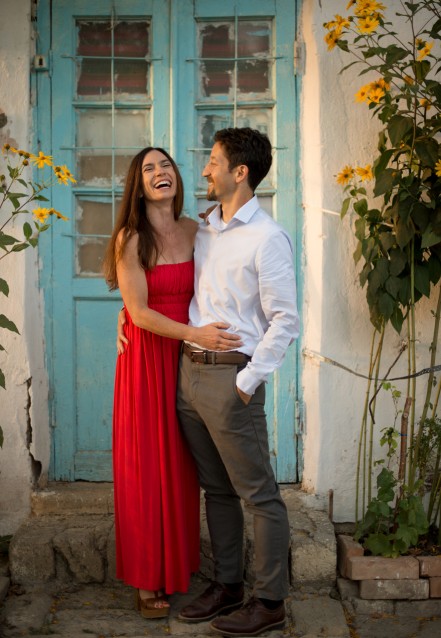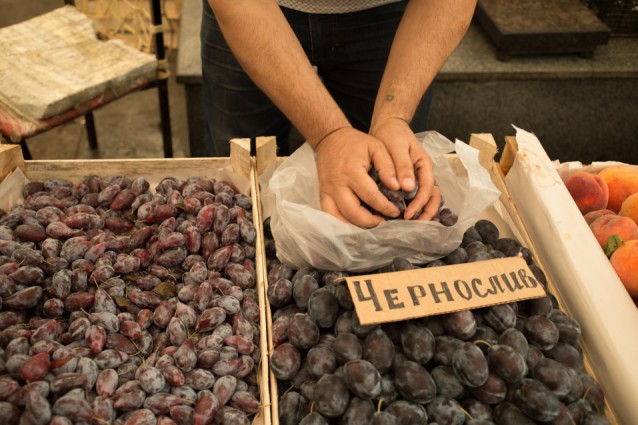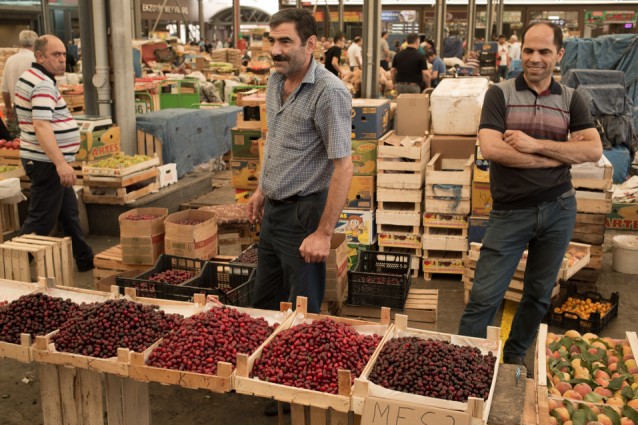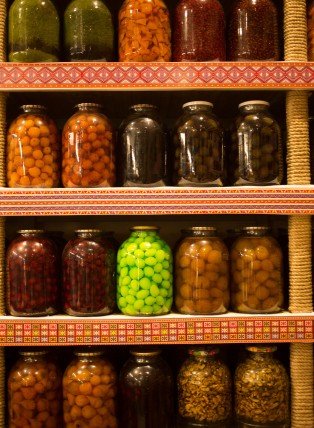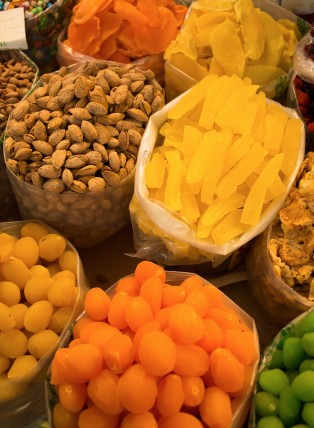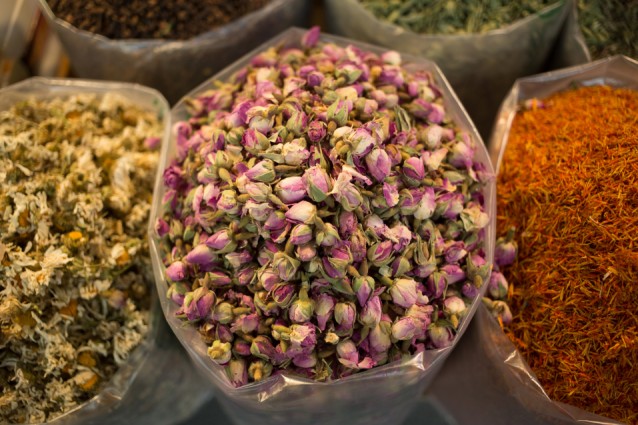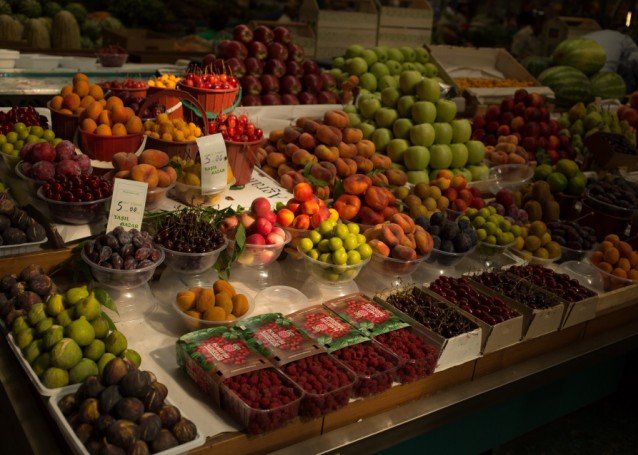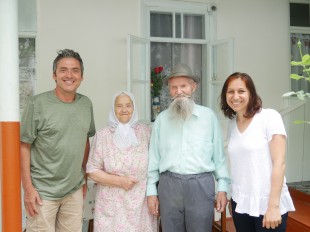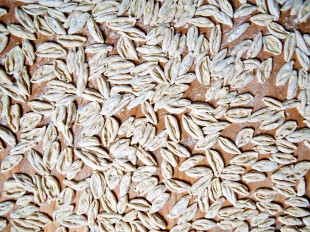Clotho Spinner Hasebe is an American expat who’s been living in Azerbaijan for seven years spread over two postings between 2008 and 2019. Since 2011 she’s been leading fellow expats on familiarization tours of where to find the best Azerbaijani produce in Baku. Visions joined one of Clotho’s “Going Local!” tours in early September 2018 and then sat down with her to tease out her best bits of advice for newly arrived expats struggling to get to grips with their local food shopping, options for which have grown significantly over the last few years. The following is an edited and abridged version of our conversation...
VoA – Why did you start offering the familiarization tours?
CSH – I heard a lot of expats expressing their disappointment in the quality and variety of fresh produce available in Azerbaijan. I was surprised to hear them saying this until I realised that people just didn’t know where to find fresh fruits and vegetables. When we originally moved here in 2008, the bazaars and neighbourhood produce stands were the only places to get fresh food, so that’s where everyone shopped. As the years passed, grocery stores began to open. New waves of expats arrived and they naturally gravitated towards the grocery stores because that’s what they are familiar with in the European and North and South American places where they were generally from. But the produce in the grocery stores wasn’t as fresh as it was in the bazaars, and expats mistakenly believed this was all that was available to them.
So how did you discover Baku’s bazaars?
When we arrived in 2008, this is where everyone shopped. Fellow expats showed me their favourite places and I, in turn, showed other expats when they arrived. Over time the bigger grocery stores came in, and I realised the expats didn’t know about the bazaars anymore. Very few people speak English in the bazaars, and this language difference can be a barrier to entry for foreigners who don’t speak Azerbaijani. I thought that if I could just show them the bazaars, translate some common food names, explain how it works (like it’s okay to taste things before you buy them or it’s okay to ask for less than a kilo... all the little things that can be overwhelming if you can’t communicate well), then it would help expats feel comfortable going to the bazaars and exploring.
When you first started exploring the bazaars, did you find it quite overwhelming?
No, really, I love food and I love cooking and I loved the abundance of fresh and seasonal ingredients. In the US, where I’m from, it’s a popular thing now to eat only seasonally. But you have to work hard to figure out what’s in season because you have everything all the time. The only way you might know that the raspberries are in season is because they are a little bit cheaper than when they’re not in season. But here in Azerbaijan, if it’s not in season it’s not here.
What are the major challenges faced by expats when they come to baku and need to do their shopping?
They can’t find the fresh fruits and vegetables that they’re looking for. Because they haven’t visited the bazaars, they think that what they see on the shelves in the grocery stores is all that is available. They’re missing the quality appearance of the fresh produce that they are used to finding in the farmers markets and natural foods markets of their home countries. Finding meat with the texture, taste and cut that they’re used to is also a challenge for new expats.
What kind of feedback have you received from people after your tours, have you found that they have made a difference?
Because I give my tours during the workday, most of the people who come along are stay-at-home parents or work-from-home spouses. When one of your roles is to provide food for your family that is both comforting and familiar, it’s a hinderance when you can’t find the necessary ingredients. This is especially so for newcomers. The comfort of a familiar meal can go a long way towards helping your family settle in to their new environment. The emails I get are invariably – I feel so much better... thank you so much... this helps me...my kids will be so happy.
Have you got any plans to do anything on a bigger scale?
I’m thinking about doing a cooking class, along the lines of learning how to cook from scratch with the ingredients that you find here. I think people have the mistaken impression that cooking from scratch is complicated and that you have to be an experienced cook to be successful. But it’s not complicated and you don’t have to be experienced. I want to help people, again, to feel comfortable doing this. The first time we moved here everyone cooked everything from scratch because there were no prepared foods available, not even pre-sliced bread. Of course the beautiful, delicious tandir bread was available – which is amazing, please don’t get me wrong! These days there are a lot more things available including all kinds of bread, even gluten-free baked fresh right here. Still, I think it’s liberating to know how to make things from scratch, and so I’d like to share this knowledge. Making hummus from scratch, making salsa from scratch, chips (crisps) – how to make those from scratch, salad dressings, a big, fresh salad, how do you do that if it the salad greens don’t come pre-washed and ready? Things like that.
What are your thoughts in general on Azerbaijani produce?
I think it’s amazing, and I love it. I especially like that it’s seasonal. The produce isn’t picked green, but at the peak of freshness. You quickly learn what a real peach tastes like, or what really sweet grapes taste like because they’re not travelling far from the farms to the market here. It’s a whole other level of freshness. And the same with the dried fruit and nuts. My son is six and he loves the Azerbaijani raisins. When we were back in the States in the summer, I bought him a little box of raisins for his lunch box and he refused to eat them because they weren’t big and plump and sweet and fresh like they are in Azerbaijan.
So what are the main differences between what you get in America and what you get in Azerbaijan?
The food here is seasonal and harvested at just the right time. I think the taste of tomatoes is unlike any other place I’ve ever been. I’d say the same about the small Persian cucumbers, which are so common here, but hard to find in the US. As far as the fruits are concerned, I love the varieties of apples and pears in fall, and the strawberries I think are incredible. The figs and the pomegranates are without equal.
|
Clotho’s advice for visiting Baku’s bazaars: |
In Azerbaijan, every region is known for different produce. Have you travelled around and got to know the produce from each region?
I’ve explored the regions but not for the produce. I like to know where things come from, so I often ask that question in the bazaar. That’s how I’ve learned that the citrus, for example, is from Lenkeran and that pecans are also grown in the south while other nuts are from the north and west.
When you travel and see something by the side of the road, do you make a point to stop and try it?
Not usually for fresh produce because I haven’t always had good luck with quality and freshness on the side of the road. I will say that the cheeses have been a wow for me in the villages. And the honey! I have a favourite honey guy in the Talysh Mountains and he sends jars of honey to me in a taxi. I had a granola bar business in the US, and I continue to bake them here for friends and family. The quality of honey is fundamental to the flavour and texture of the granola bars, and my favourite Azerbaijani beekeeper delivers a beautiful product.
Can you explain some of the produce in the bazaar that you’ve found ways of using creatively?
I use doshab, a local molasses that’s made from mulberries or dates, to make brown sugar. I love to share this technique with other expats because brown sugar is an important ingredient in baking and grilling, and making it yourself costs a fraction of what it does in the store. I also like to use lavash to make chips. When we moved here 11 years ago, there were no chips. Now you can find many varieties at the grocery stores, but I still prefer to make my own. It’s easy, I know exactly what’s in them, and it’s fun to customise them for my guests. I use the zoghal (Cornelian cherries – Ed.) as an alternative to fresh cranberries and dried barberries as an alternative to dried cranberries.
What about haggling, is that something people should do?
It’s minimal. If I hear a price that’s not in line with what I know it should be, then I haggle. Or I may ask for a discount if I’m buying a lot. But in all reality the price of fruits and vegetables is so inexpensive here. The people at the bazaar are working hard to make a living and if I feel like they’re treating me honestly then haggling to get a slight price reduction doesn’t leave me with a good feeling.
Which products spring to mind that people should definitely buy during each season?
This could be a big list! In the late summer to early autumn don’t miss the stone fruits like peaches, plums and nectarines, fresh berries like raspberries, blackberries, strawberries, and figs too. Apples and pears arrive in the autumn, as do persimmons and pomegranates. In the wintertime the citrus arrives in full force: mandarin, naval oranges, blood oranges, kumquat. In the spring the asparagus arrives along with enormous bouquets of fresh lilacs. You have to be in the bazaars regularly or you’ll miss asparagus, it’s there for three weeks and then it’s gone. Truffles also come in the spring, along with so many varieties of potatoes. In late spring and early summer, the strawberries and the cherries start coming in, followed by several varieties of melons in the heart of summer. Tomatoes and cucumbers are available year round, but I find them tastiest in the warmer months. Alternately, the fresh herbs and other greens are at their peak in the cooler months even though they’re available year round.
What is it about Azerbaijan that makes you feel so at home here?
I’ve always found the rhythm of the streets and the city fascinating, especially in the older parts of Baku. The Azerbaijani countryside is gorgeous. The richness and variety of the landscapes are remarkable given the relatively small size of the country. I like biking and hiking and camping, and there’s a wonderful feeling of freedom when doing that here. And the food, of course!
|
Where to shop: Yashil Bazaar (Khatai Avenue) – this is the centrepiece of the Going Local! food tour because it’s home to Baku’s biggest selection of fresh fruit and vegetables, as well as huge quantities of nuts and spices, dried fruits and jams. Teze Bazaar (Samed Vurghun Street) – operating for over 80 years, Teze Bazaar today has a smaller selection of fruit and veg than Yashil Bazaar but is still worth visiting for its fish (including sturgeon and caviar) and to experi- ence the general hubbub of an Eastern bazaar. Ivanovka (15 Nakhchivani Street) – named after the Russian Molokan village famed for its farm products, Clotho recommends this for its wide selection of meats. It’s especially good for pork but also sells beef and lamb, and even rabbit and pheasant. This is also where I direct people looking for wheat and oat bran, Clotho said. Brothaus (opposite Ivanovka) – this German bakery is included on the tour for its gluten-free bread options, but you’ll also find here a decent selection of croissants, donuts and cakes. Gastronomy (57 Narimanov Avenue) – an excellent source of seafood, ingredients for Asian cuisine, Belgian chocolate and frozen meat (turkey, Brazilian beef, pork, loin and bacon). |
